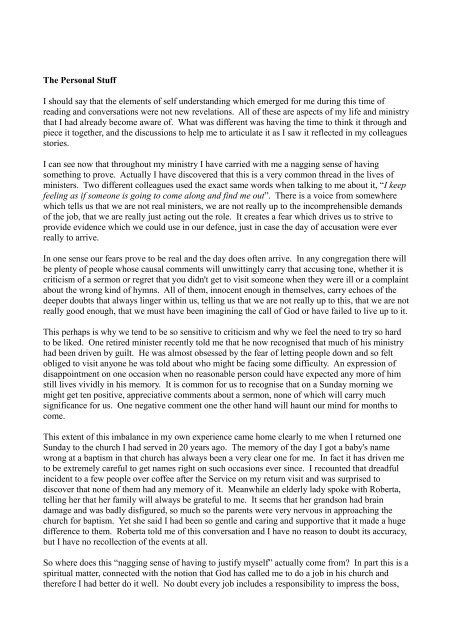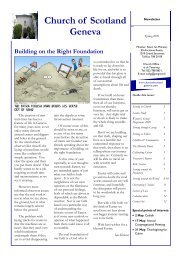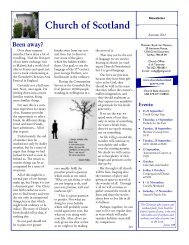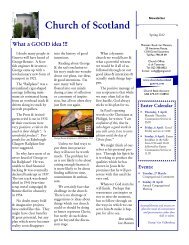Study Leave Report Summer 2011 Ian Manson This is the first time I ...
Study Leave Report Summer 2011 Ian Manson This is the first time I ...
Study Leave Report Summer 2011 Ian Manson This is the first time I ...
You also want an ePaper? Increase the reach of your titles
YUMPU automatically turns print PDFs into web optimized ePapers that Google loves.
The Personal StuffI should say that <strong>the</strong> elements of self understanding which emerged for me during th<strong>is</strong> <strong>time</strong> ofreading and conversations were not new revelations. All of <strong>the</strong>se are aspects of my life and min<strong>is</strong>trythat I had already become aware of. What was different was having <strong>the</strong> <strong>time</strong> to think it through andpiece it toge<strong>the</strong>r, and <strong>the</strong> d<strong>is</strong>cussions to help me to articulate it as I saw it reflected in my colleaguesstories.I can see now that throughout my min<strong>is</strong>try I have carried with me a nagging sense of havingsomething to prove. Actually I have d<strong>is</strong>covered that th<strong>is</strong> <strong>is</strong> a very common thread in <strong>the</strong> lives ofmin<strong>is</strong>ters. Two different colleagues used <strong>the</strong> exact same words when talking to me about it, “I keepfeeling as if someone <strong>is</strong> going to come along and find me out”. There <strong>is</strong> a voice from somewherewhich tells us that we are not real min<strong>is</strong>ters, we are not really up to <strong>the</strong> incomprehensible demandsof <strong>the</strong> job, that we are really just acting out <strong>the</strong> role. It creates a fear which drives us to strive toprovide evidence which we could use in our defence, just in case <strong>the</strong> day of accusation were everreally to arrive.In one sense our fears prove to be real and <strong>the</strong> day does often arrive. In any congregation <strong>the</strong>re willbe plenty of people whose causal comments will unwittingly carry that accusing tone, whe<strong>the</strong>r it <strong>is</strong>critic<strong>is</strong>m of a sermon or regret that you didn't get to v<strong>is</strong>it someone when <strong>the</strong>y were ill or a complaintabout <strong>the</strong> wrong kind of hymns. All of <strong>the</strong>m, innocent enough in <strong>the</strong>mselves, carry echoes of <strong>the</strong>deeper doubts that always linger within us, telling us that we are not really up to th<strong>is</strong>, that we are notreally good enough, that we must have been imagining <strong>the</strong> call of God or have failed to live up to it.<strong>Th<strong>is</strong></strong> perhaps <strong>is</strong> why we tend to be so sensitive to critic<strong>is</strong>m and why we feel <strong>the</strong> need to try so hardto be liked. One retired min<strong>is</strong>ter recently told me that he now recogn<strong>is</strong>ed that much of h<strong>is</strong> min<strong>is</strong>tryhad been driven by guilt. He was almost obsessed by <strong>the</strong> fear of letting people down and so feltobliged to v<strong>is</strong>it anyone he was told about who might be facing some difficulty. An expression ofd<strong>is</strong>appointment on one occasion when no reasonable person could have expected any more of himstill lives vividly in h<strong>is</strong> memory. It <strong>is</strong> common for us to recogn<strong>is</strong>e that on a Sunday morning wemight get ten positive, appreciative comments about a sermon, none of which will carry muchsignificance for us. One negative comment one <strong>the</strong> o<strong>the</strong>r hand will haunt our mind for months tocome.<strong>Th<strong>is</strong></strong> extent of th<strong>is</strong> imbalance in my own experience came home clearly to me when I returned oneSunday to <strong>the</strong> church I had served in 20 years ago. The memory of <strong>the</strong> day I got a baby's namewrong at a bapt<strong>is</strong>m in that church has always been a very clear one for me. In fact it has driven meto be extremely careful to get names right on such occasions ever since. I recounted that dreadfulincident to a few people over coffee after <strong>the</strong> Service on my return v<strong>is</strong>it and was surpr<strong>is</strong>ed tod<strong>is</strong>cover that none of <strong>the</strong>m had any memory of it. Meanwhile an elderly lady spoke with Roberta,telling her that her family will always be grateful to me. It seems that her grandson had braindamage and was badly d<strong>is</strong>figured, so much so <strong>the</strong> parents were very nervous in approaching <strong>the</strong>church for bapt<strong>is</strong>m. Yet she said I had been so gentle and caring and supportive that it made a hugedifference to <strong>the</strong>m. Roberta told me of th<strong>is</strong> conversation and I have no reason to doubt its accuracy,but I have no recollection of <strong>the</strong> events at all.So where does th<strong>is</strong> “nagging sense of having to justify myself” actually come from? In part th<strong>is</strong> <strong>is</strong> aspiritual matter, connected with <strong>the</strong> notion that God has called me to do a job in h<strong>is</strong> church and<strong>the</strong>refore I had better do it well. No doubt every job includes a responsibility to impress <strong>the</strong> boss,





